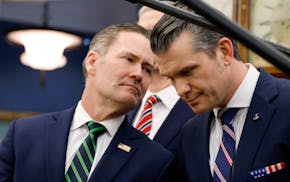Opinion editor's note: Strib Voices publishes a mix of commentary online and in print each day. To contribute, click here.
•••
Next year the world will be invited to celebrate as America turns 250.
What if few foreign visitors come to the party — in part because the U.S. no longer seems to be the beacon of democracy?
And what if that dimmed beacon beckons far fewer international travelers than expected to other events slated stateside, like the 2026 World Cup, scheduled a week after America's semiquincentennial (the official term, but let's stick with 250th)? Or opt to attend soccer matches in cohost countries Canada and Mexico, considered more welcoming than the U.S.?
Or what if global sports fans throw shade on the 2028 Summer Olympics in Los Angeles? Or, of more importance and immediacy to Minnesota, the International Ice Hockey Federation's World Junior Championship, which fans will unwrap the day after Christmas — Boxing Day in Canada, the country expected to send the most visitors to the Twin Cities for the tournament?
Minnesota already gets about 55% of its international visitors from friendly Manitoba or the other nine provinces and three territories in a country that Lauren Bennett McGinty, the executive director of Explore Minnesota, considers so close and integrated it's like a "domestic market."
Canadians may have felt the same about Minnesota and, by extension, America. But President Donald Trump hasn't been so neighborly. In fact, he's been downright hostile with tariffs and talk about annexing Canada, calling it the "51st state," and denigrating its government by using "governor" instead of "prime minister" when referring to Justin Trudeau, who resigned the office in March.
Understandably, normally understated Canadians are riled, as reflected in a recently released Ipsos poll of 29 nations, in which Canada had the biggest drop in confidence that "the U.S. will have a positive impact on world affairs." The 33-percentage-point plunge echoes the 20-plus-percentage-point implosion in support for Canada's Conservative Party in Monday's election, with voters rallying to Liberal Party Prime Minister Mark Carney's pivot of the Gordie Howe-inspired "elbows up" from a pugilistic hockey phrase into a patriotic campaign slogan.
The rinks where elbows are indeed often up ideally would be packed with fans from Canada and eight European nations along with Americans in an event with an expected economic impact of $75 million, according to Minnesota Sports and Events, which cited a study of the 2024 U.S. Olympic Gymnastics Team Trials, just one of several successful events championed by the entity. About 8,000 hotel-room nights are anticipated to be booked for the hockey tournament that runs through Jan. 5, 2026 — not usually the hottest hotel time in often-frigid Minnesota.
The state had been building post-pandemic momentum: 614,200 international visitors last year spent about $570.6 million, about a 3.6% increase from 2023, according to Explore Minnesota. Besides Canada, the United Kingdom, Germany and China — as well as a steady Scandinavian contingent — contributed to the global cohort traveling from Voyageurs National Park to Paisley Park and natural and man-made wonders in between.
But Explore Minnesota cited the latest Tourism Economics Global Travel Service update, released in late March, that predicted a 9.4% decline in inbound U.S. visits, led by an even steeper 20.2% falloff from Canada. The risks, the report stated, "still skewed toward the downside."
If so, it's a hit to a sector that normally "fuels local economies across the U.S.," states the U.S. Travel Association, which added these key stats: 72.4 million visitors from abroad spent about $183 billion in the U.S. last year, supporting 929,000 jobs, contributing $26.1 billion in tax revenue, reducing the average American household tax burden by $205 a year.
International visitors, especially to events like the World Juniors, "fill our hotels, fly into our airports, eat at our restaurants, shop at our retail," said Wendy Blackshaw, president and CEO of Minnesota Sports and Events. They "spend more money than people who are just coming from down the street. We love our Minnesotans — we want them to come. But we also love the economic impact that comes from bringing people in from outside the state of Minnesota."
But much of that is jeopardized, Allison O'Connor, the U.S. Travel Association's senior vice president of strategic communications, said via email. Among the factors she listed were the strong U.S. dollar, long visa wait times, concerns over travel restrictions, the slowing U.S. economy, recent safety concerns and "a question of America's welcomeness."
Conversely, there's reassuring congressional predictability in Sen. Amy Klobuchar's efforts to find solutions. The Minnesota Democrat, whom Bennett McGinty called a "really big champion for tourism," is seeking bipartisan support to encourage and enhance international travel. "There is national concern mounting about the tourism industry," Klobuchar, co-chair of the Senate Travel and Tourism Caucus, said, citing several factors, including the president's reckless rhetoric.
"You have the combination of the economics of it, but also the pride," the senator said. "Because if he keeps going after these nations that have long been our allies, like Canada and Japan and South Korea and Scandinavia and all of Europe, they're just going to go somewhere else for their vacations, and so that is a major concern."
An economic concern, to be sure. But also a geopolitical one. Addressing it will require citizens and their elected leaders alike to speak truth to power in a rediscovery of the values that'll be touted at America's birthday bash, and hopefully for at least another 250 years.

Rash: Pope Francis' lesson and legacy of love, faith and service
Rash: The virtue and necessity of immigration

Rash: International Film Festival a reason to return to the theater


